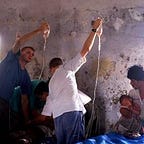The very quiet end to ‘Serco Test & Trace’
Five days ago, on Thursday August 5th, the government gave notice as quietly as it possibly could that the contact tracing part of so-called ‘NHS Test & Trace’ will be coming to an end, and will be replaced by a system run by local health teams (Local Tracing Partnerships).
The notification came in a section slipped into the 9th update of a document called ‘COVID-19 contain framework: a guide for local decision-makers’ and reads as follows (my highlighting):
Now, the section is written in such as a way as to create some plausible deniability, but the direction of travel is clear. The private call centres run by Serco, Sitel and the like will no longer be the first step in the contact tracing chain, with local teams stepping in when they fail; instead, we’ll start to get something like the contact tracing service we could and should have had for the last 18 months, with local teams using local, trusted phone numbers to let people know that they need to isolate as a positive case, or ask close contacts to get tested, offering the support needed to do so.
It is pretty obvious why the government should have chosen to slip the notification out so quietly, just a few hours before the Prime Minister went off on his isolation-avoiding holiday. The updated document is as close to an admission as we’re going to get that local testing is more effective than anything the big firms can offer, and that this is always been the case, and the government didn’t want to the awkward questions about how an why they got it so wrong for so long.
More importantly, it allows them to avoid scrutiny about how exactly the big form contracts will be brought to an end, with what pay offs, and whether the budget allocated will now be transferred to local authorities to do a better job.
A partial answer to the last question arrived this morning, in the form of a new document called ‘Self-isolation practical support: guidance for local authorities and the voluntary and community sector’.
This document contains some detail on the continuation of the small amount of funding made available to date, but only through to the end of September, with no guarantee beyond that. At the same time, it sets ou a “minimum support expectation” of local authoritiees, including ensuring access to food and supplies and the provision of”practical and emotional support”.
While such support is desirable, it was never a part of the contract requirements when the private firms had the job (or if it was, it was ignored), and it looks very much like the government is acting like the government generally does: imposing whatever duties it likes on local government, without consideration of the resources needed.
Suffice to say, there’s a lot of scrutiny of the government to be done here, from whether Serco are about to get another massive handout, through to the funding of already massively overstretched councils (and the risk of two tiers of provision, with richer areas able to offer more support).
It looks as though the government hush-hush strategy may have worked, at least for now. No opposition party has made any public announcement on the changes notified, and may simply not have read the detail. Nor, mind you have those organizations who’ve been calling for contact tracing to be made local and public for 18 months. They, too, appear to have fallen asleep just at the wrong time.
There is still time to challenge the government, but at the moment it looks like they’re going to get away with it. Again.
